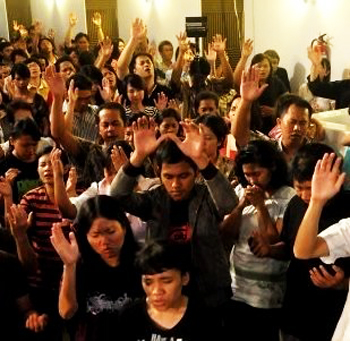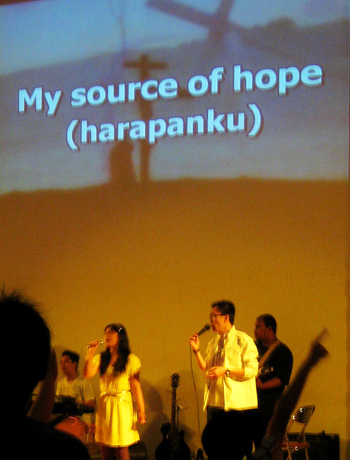Pentecostalism and its expressive religiosity resonates with a new generation of Christians
En-Chieh Chao
Pentecostals prefer an expressive and emotive worship style En-Chieh Chao |
On a November afternoon in 2009, I was pulled from the torrential rain into the muddy entrance of a church by Frances, a student studying English at Satya Wacana University in Salatiga, Central Java. She high-fived the person handing out news bulletins at the door, and ran into the worship hall with me in tow. As the sound of evangelical rock grew louder, I saw a giant screen hanging in the air, projecting slides of lyrics and images. Microphone stands, drums, electronic guitars, and musicians filled the space beneath. A young female worship leader was leading the congregation through gospel rock to soft ballads, with nine spandex-clad dancers to her left and three tambourine dancers spinning before her in white tulle dresses.
A full hour of singing and dancing climaxed with the resounding voices of bahasa roh, the Indonesian term for speaking in tongues. Congregants raised their hands, some embracing each other. People were murmuring or shouting unintelligible words. Their faces were distorted, their eyes tightly shut with deep frowns on their brows. This, as I later learned, was the worship style of churches that are labeled ‘pentakosta’ for their doctrines and ‘karismatik’ for their ways of worshipping.
A new generation
Under the legacy of New Order mandatory religious affiliation and religious education, as well as the influence of transnational Christian media and missionary networks, even the children of ‘nominal Christian’ parents nowadays display a more deeply internalised Christianity as an integral part of their self-identity. Unsatisfied with what they view as the superficial religious affiliations of their parents and grandparents, they have begun to see mainstream churches as soulless places to worship God. In an interesting parallel to the phenomenon of the children of Javanist Muslims becoming orthodox, many offspring of mainstream church members have become born-again Christians over the last two decades.
Recent figures suggest that among Indonesia’s approximately 17 million Protestants, 6 million are Pentecostals, many of whom are still registered members of mainstream churches. This number might be even larger if we count Christians in other churches that do not claim the Pentecostal label, but have adopted the charismatic styles that distinguish Pentecostalism. This trend represents a remarkable religious transformation of Christianity in Indonesia, where the Protestant minority has historically displayed a rather sober brand of Calvinism. The mainline Javanese Christian Church (GKJ), for example, has long featured a sedate worship style. The expressive charismatic worship style – clapping, yelling, loud pop gospel music – is growing, but still relatively uncommon.
Charismatic churches’ dynamic worship styles have also developed a cosmopolitan texture. English songs are enjoyed beside Indonesian ones. The Australian rock and worship band the ‘Planetshakers’ is highly popular, and so is the Indonesian band ‘True Worshippers’. The born-again Pentecostals diligently read Indonesian translations of gospel books written by American authors such as Joyce Meyer and Choo Thomas. Their Indonesian versions have become bestsellers. Even the Hebrew word ‘sialom’ (shalom) has been creatively appropriated as the Pentecostal counterpart of the Muslim greeting ‘Assalamualaikum,’ and is uttered in services and daily life alike.
 |
Indonesian translations of American gospel books have become best sellers En-Chieh Chao |
Contesting pluralism
In the contemporary vista of Indonesian Christianity, Pentecostalism also appears transformative because of its power to transcend ethnic divides. Most of Indonesia’s Christian communities have been ethnically defined since the colonial period. In many of the Pentecostal churches today, however, the ethnic profile is pluralistic. Like their predecessors from Azusa Street in Los Angeles, Brazil and Zimbabwe, these new Pentecostal churches have developed followings that are more ethnically inclusive than their mainline counterparts.
In Java, Chinese-Indonesian and Javanese believers worship together, and both serve as leaders in Pentecostal congregations, despite the history of uneasy relations between Chinese and other ethnic groups. Many Chinese Indonesians favour Pentecostalism because it enables them to overcome negative stereotypes by emphasising prosperity as a sign of God’s grace. They strive to become moral exemplars in society. As a result of frequent coordination between different groups, it is not out of the ordinary for ethnic Chinese pastors to preach to Javanese congregants, or vice versa. Ethnic groups from Eastern Indonesia are also well-represented in Pentecostal congregations in Java. As the thriving charismatic Christian movement puts more and more effort into redeeming millions of pribumi souls from various social strata, Pentecostalism appears as a new social force that has the potential to more broadly reshape ethnic relations. Indeed, the development of vibrant charismatic churches is part of an ongoing dissociation of ethnicity from religion in Indonesia. As domestic migration has de-territorialised ethnic groups and transnational media has facilitated varieties of lifestyles, the metropolitan churches in the cities prove more practical, and even liberating, than the parochial circles of traditional ethnic churches.
Although the majority of Pentecostal converts are former Protestants and Catholics, Muslim conversion to Pentecostalism is not unheard of. Christian proselytising among Muslims has long been a legal and social issue, leading to the creation of two decrees in the 1970s that forbid proselytising among those ‘who already have a religion’ or building worship facilities without a neighbourhood’s endorsement. Examples of peaceful co-existence among Christians and Muslims are abundant but there are, from time to time, conflicts and calls to shore up the boundaries between religious communities. For all its internal pluralism, exclusive tendencies within the charismatic community are also, alarmingly, perceptible. Some charismatic churches openly ridicule other religions and forbid members to date or marry non-Christians, while encouraging members to proselytise whenever possible. As such, it will not be an easy task for Indonesian Pentecostalism to develop a broader vision of its place in a religiously plural society.
A rewarding path to piety
Twenty-five-year-old Frances converted to Pentecostalism in the summer of 2009. She was born to an Indonesian Catholic family of Chinese-Dutch ancestry in Semarang and raised as a Catholic. During a cross-denominational charismatic retreat she attended that summer, she decided that she wanted to convert. When her parents and grandparents asked why she felt she had to change her religion, she told them that in the church she was attending now, her ‘spirituality would grow stronger’. Frances was one of a large contingent of mainline Protestants and Catholics who converted to Pentecostalism because of the more engaged spirituality it has offered them.
Charismatic Christianity provides a quick and rewarding path to deepen a pre-existing religious identity. Unlike the lengthy learning processes required to master Islamic recitation or complete training for Calvinist ministry, a person does not require formal training to become a Pentecostal preacher. Whoever is touched by the Holy Spirit can speak in tongues, heal the disabled, and become a spiritual leader.
 |
The congregations of charismatic churches display ethnically pluralistic profiles En-Chieh Chao |
In an environment of increasing Islamic public religiosity, the ease with which Pentecostalism allows its members to express their religiosity has been a compelling option for Christians. Even if some other Protestant and Catholic churches might offer a lively worship ambiance, Pentecostal churches have a feature that sets them apart for their followers, namely their relatively egalitarian and participatory leadership. The openness of Pentecostal leadership to lay men and women remains their unrivalled attraction to many followers.
These trends notwithstanding, it is too early to announce the decay of ethnic mainline churches. And while some mainline churches have incorporated limited elements of charismatic worship, many still cherish their own more solemn traditions. A third-year college student at Satya Wacana and a GKJ member told me in 2010 that she could not feel calm in a charismatic church. ‘Only in a quiet place like 55 [the nickname for the GKJ church building in front of the campus] can I feel God,’ she said. Similarly, a forty-five-year-old active participant in a GKJ congregation, who was also the head of his neighbourhood, lamented to me, ‘I can dance and cry like them [Pentecostals], too. The atmosphere there is exciting. But what about afterwards? Can we find God there?’ But for Frances and a growing number of Pentecostal converts, though, the answer is an unambiguous yes.
En-Chieh Chao (zolachao@gate.sinica.edu.tw) is a Post-Doctoral Research Fellow at the Center for Social Sciences and Humanities at Academia Sinica.



